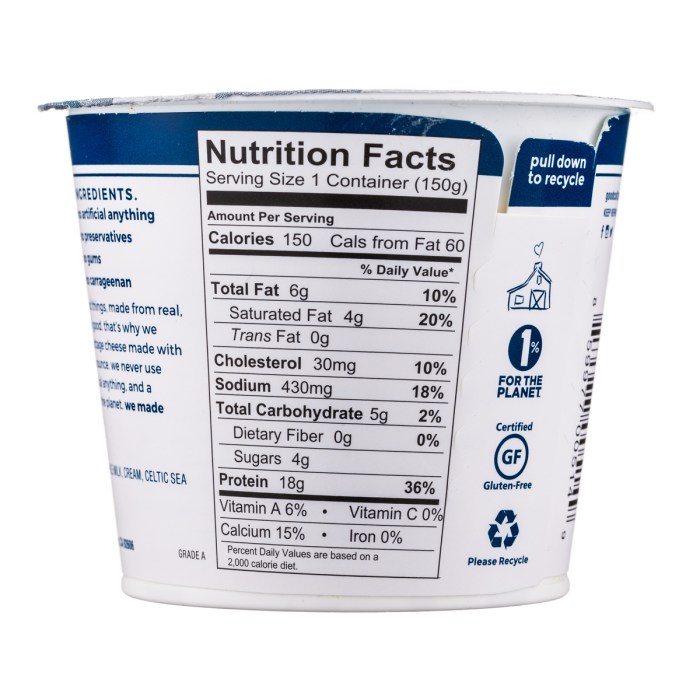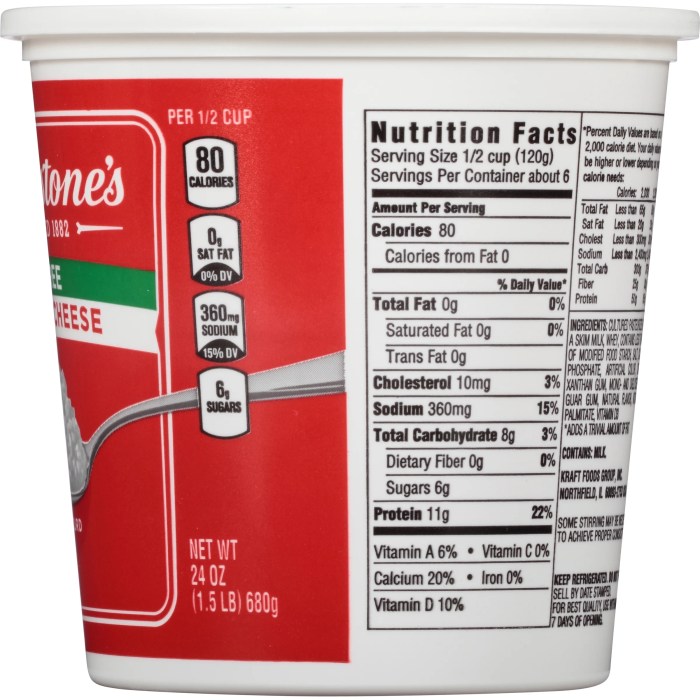Nutritional Profile of Non-Fat Cottage Cheese

Non fat cottage cheese nutrition – Non-fat cottage cheese offers a valuable nutritional profile, making it a popular choice for those seeking a protein-rich, low-fat food option. Its versatility allows for inclusion in various diets, from weight management plans to those focused on building muscle mass. Understanding its macronutrient and micronutrient composition is key to appreciating its health benefits.
Macronutrient Composition of Non-Fat Cottage Cheese
The macronutrient content of non-fat cottage cheese varies slightly depending on the brand and manufacturing process. However, a general overview provides a useful understanding of its nutritional value. The following table presents approximate values for a typical serving. Note that daily values are based on a 2000-calorie diet and may vary based on individual needs.
| Nutrient | Amount per 100g | Amount per Serving (150g) | % Daily Value (based on 2000 calorie diet) |
|---|---|---|---|
| Protein | 28g | 42g | ~84% |
| Carbohydrates | 4g | 6g | ~2% |
| Fat | 0.5g | 0.75g | ~1% |
Micronutrient Content of Non-Fat Cottage Cheese
Beyond its macronutrient profile, non-fat cottage cheese is a source of several essential micronutrients. These contribute to overall health and well-being.Non-fat cottage cheese provides a range of vitamins and minerals. These include:
- Vitamin B12: Crucial for nerve function and red blood cell formation. Amounts vary but are generally significant.
- Riboflavin (Vitamin B2): Essential for energy metabolism and healthy skin.
- Calcium: Vital for strong bones and teeth. A good source in non-fat cottage cheese contributes to daily calcium needs.
- Phosphorus: Works with calcium for bone health and is involved in various bodily functions.
- Selenium: An antioxidant mineral that plays a role in protecting cells from damage.
Glycemic Index and Glycemic Load of Non-Fat Cottage Cheese
The glycemic index (GI) and glycemic load (GL) are measures of how quickly a food raises blood sugar levels. Non-fat cottage cheese possesses a low glycemic index and a low glycemic load. This means it causes a slow and gradual rise in blood sugar, making it a suitable choice for individuals managing blood sugar levels, including those with diabetes.
Right, so non-fat cottage cheese, mega low in calories, right? But if you’re after something a bit more, erm, flavoursome, check out the boar’s head muenster cheese nutrition facts – it’s a whole different ball game, nutritionally speaking. Then again, nothing beats the simplicity (and protein punch!) of that non-fat cottage cheese for a quick and healthy snack.
The low GI and GL are attributed to its relatively low carbohydrate content and the presence of protein, which slows down the absorption of glucose.
Health Benefits of Non-Fat Cottage Cheese Consumption: Non Fat Cottage Cheese Nutrition
Non-fat cottage cheese offers a compelling nutritional profile that supports various aspects of health and well-being. Its combination of high protein, low calories, and essential minerals makes it a valuable addition to a balanced diet. This section will explore the specific health benefits associated with its consumption.
Weight Management, Non fat cottage cheese nutrition
Non-fat cottage cheese is a powerful tool for weight management due to its high protein content and low calorie density. Protein promotes satiety, meaning it keeps you feeling fuller for longer, reducing overall calorie intake. The low calorie count further contributes to a calorie deficit, essential for weight loss. For example, a typical serving of non-fat cottage cheese provides a significant amount of protein with relatively few calories, making it a satisfying and low-calorie snack or meal component.
This helps individuals manage their weight effectively without sacrificing nutritional needs.
Muscle Building and Maintenance
Protein is the fundamental building block of muscle tissue. Non-fat cottage cheese, being rich in protein, plays a crucial role in muscle protein synthesis, the process of building and repairing muscle. Adequate protein intake is vital for athletes, individuals engaged in strength training, and those seeking to maintain muscle mass as they age. Consuming non-fat cottage cheese regularly contributes to sufficient protein intake, supporting muscle growth and preventing muscle loss.
This is particularly beneficial for individuals aiming to increase muscle mass or maintain existing muscle tissue.
Bone Health
Non-fat cottage cheese is an excellent source of calcium, a crucial mineral for maintaining strong and healthy bones. Calcium is essential for bone formation and preventing conditions like osteoporosis. Adequate calcium intake throughout life is vital for preventing bone loss and maintaining bone density, especially as we age. The calcium in non-fat cottage cheese contributes significantly to the daily recommended intake, promoting strong bones and reducing the risk of fractures.
Improved Gut Health and Satiety
Beyond its macronutrient profile, non-fat cottage cheese may also offer benefits for gut health. While further research is needed to fully elucidate these effects, some studies suggest that the protein and other components in cottage cheese may contribute to a healthy gut microbiome. Furthermore, the high protein content significantly contributes to satiety, keeping hunger at bay and promoting a feeling of fullness, which is beneficial for weight management and overall dietary adherence.
This prolonged feeling of fullness can help regulate appetite and reduce cravings, leading to healthier eating habits.
Potential Drawbacks and Considerations

While non-fat cottage cheese offers numerous health benefits, it’s crucial to be aware of potential drawbacks associated with its consumption, particularly in large quantities. Understanding these aspects allows for informed choices and helps maximize the positive effects while minimizing any negative impacts.High sodium content varies significantly between brands. Some manufacturers add substantial amounts of salt to enhance flavor, which can be a concern for individuals with hypertension or those on sodium-restricted diets.
Therefore, careful label reading is essential to choose lower-sodium options.
Sodium Content and Hypertension
Excessive sodium intake is a major risk factor for hypertension (high blood pressure). Consuming large quantities of high-sodium cottage cheese could contribute to elevated blood pressure, particularly in susceptible individuals. To mitigate this risk, select brands with low sodium content, typically indicated as “low sodium” or “no salt added” on the packaging. Comparing labels and choosing brands with the lowest sodium content per serving is recommended.
Regular monitoring of blood pressure, especially for individuals with pre-existing hypertension, is crucial when incorporating cottage cheese into the diet.
Drug Interactions and Pre-existing Conditions
While generally safe, non-fat cottage cheese can interact with certain medications or exacerbate some pre-existing health conditions. For example, individuals with lactose intolerance may experience digestive discomfort, such as bloating or gas, even with non-fat varieties due to the presence of lactose. Those with kidney disease may need to limit their phosphorus intake, as cottage cheese contains a moderate amount of this mineral.
Consult with a healthcare professional or registered dietitian to assess potential interactions based on individual circumstances and medication regimens. They can provide personalized guidance on safe and appropriate consumption levels.
Selecting and Storing High-Quality Non-Fat Cottage Cheese
Choosing high-quality non-fat cottage cheese involves careful attention to several factors. Examine the ingredient list for minimal additives and preservatives. Opt for brands with a smooth, creamy texture and a slightly tangy flavor, indicative of freshness and quality. Avoid products with an unusual odor or appearance. Proper storage is equally important.
Refrigerate non-fat cottage cheese immediately after purchase and consume it within its “best by” date. Storing it in an airtight container will help maintain its freshness and prevent spoilage. Freezing cottage cheese is also an option to extend its shelf life, but it may alter its texture slightly.
Key Questions Answered
Can I eat non-fat cottage cheese every day?
Moderation is key! Daily consumption is fine as part of a balanced diet, but watch your sodium intake by choosing low-sodium varieties.
Does non-fat cottage cheese expire quickly?
Yes, it’s best consumed within a week of opening. Check the “best by” date and refrigerate properly.
Is non-fat cottage cheese good for people with lactose intolerance?
It depends on the severity. Lactose-free options are available, but some individuals may still experience digestive discomfort.
Can I freeze non-fat cottage cheese?
Yes, but the texture might change upon thawing. It’s best used in recipes where texture isn’t critical, like smoothies or baked goods.
